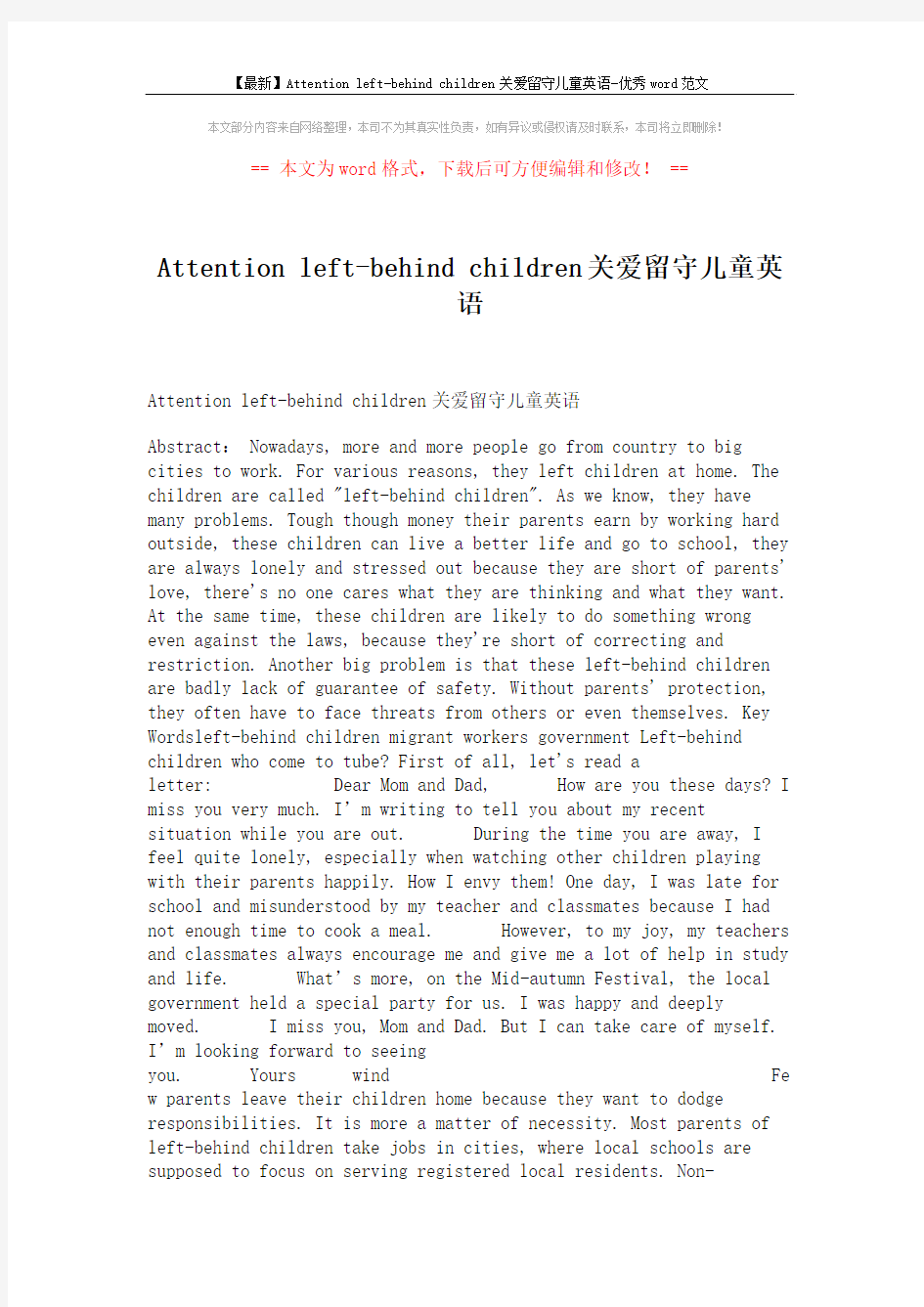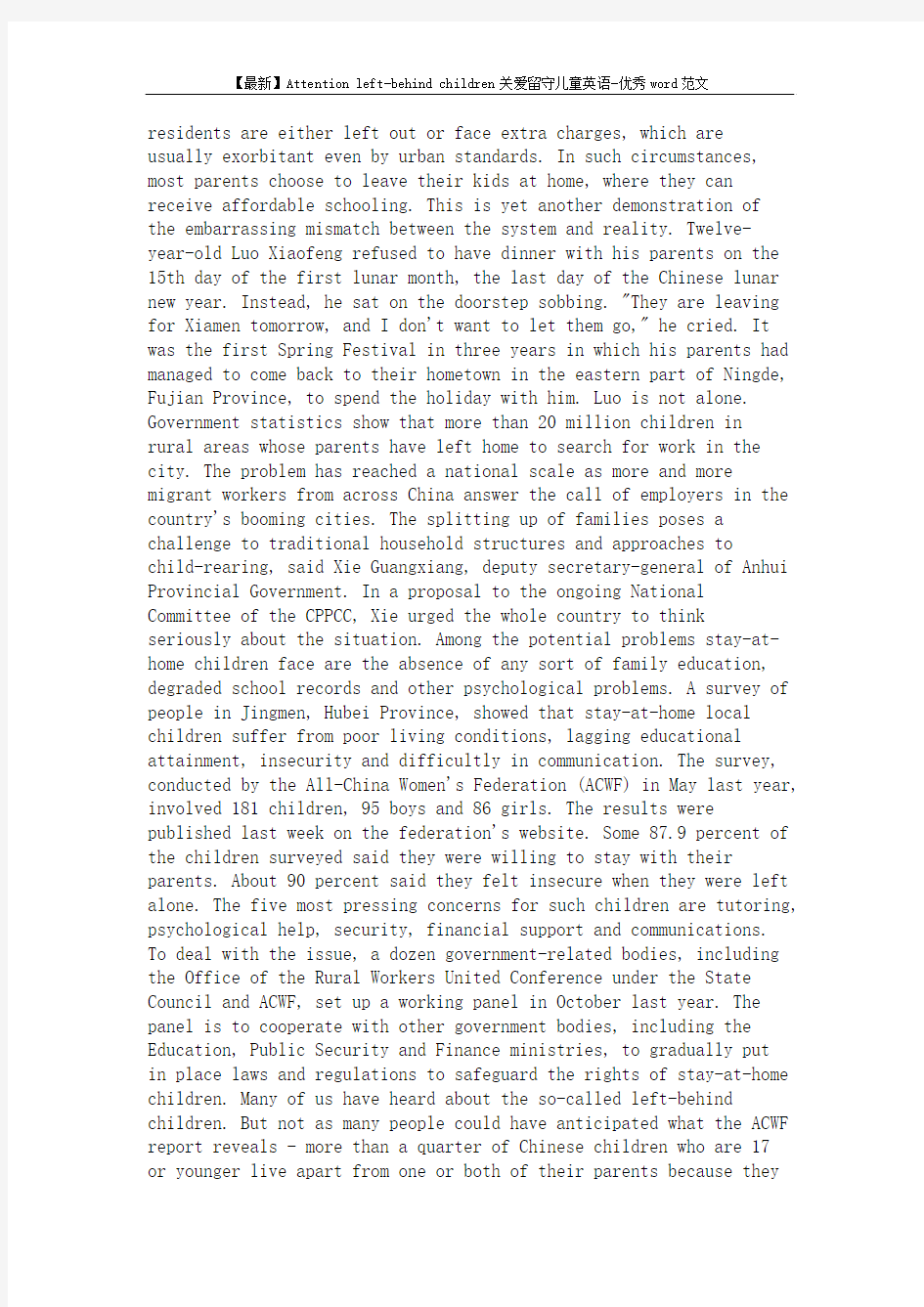

本文部分内容来自网络整理,本司不为其真实性负责,如有异议或侵权请及时联系,本司将立即删除!
== 本文为word格式,下载后可方便编辑和修改! ==
Attention left-behind children关爱留守儿童英
语
Attention left-behind children关爱留守儿童英语
Abstract: Nowadays, more and more people go from country to big cities to work. For various reasons, they left children at home. The children are called "left-behind children". As we know, they have many problems. Tough though money their parents earn by working hard outside, these children can live a better life and go to school, they are always lonely and stressed out because they are short of parents' love, there's no one cares what they are thinking and what they want. At the same time, these children are likely to do something wrong even against the laws, because they're short of correcting and restriction. Another big problem is that these left-behind children are badly lack of guarantee of safety. Without parents' protection, they often have to face threats from others or even themselves. Key Wordsleft-behind children migrant workers government Left-behind children who come to tube? First of all, let's read a
letter: Dear Mom and Dad, How are you these days? I miss you very much. I’m writing to tell yo u about my recent
situation while you are out. During the time you are away, I feel quite lonely, especially when watching other children playing with their parents happily. How I envy them! One day, I was late for school and misunderstood by my teacher and classmates because I had not enough time to cook a meal. However, to my joy, my teachers and classmates always encourage me and give me a lot of help in study and life. What’s more, on the Mid-autumn Festival, the local government held a special party for us. I was happy and deeply moved. I miss you, Mom and Dad. But I can take care of myself. I’m looking forward to seeing
you. Yours wind Fe w parents leave their children home because they want to dodge responsibilities. It is more a matter of necessity. Most parents of left-behind children take jobs in cities, where local schools are supposed to focus on serving registered local residents. Non-
residents are either left out or face extra charges, which are
usually exorbitant even by urban standards. In such circumstances, most parents choose to leave their kids at home, where they can receive affordable schooling. This is yet another demonstration of
the embarrassing mismatch between the system and reality. Twelve-
year-old Luo Xiaofeng refused to have dinner with his parents on the 15th day of the first lunar month, the last day of the Chinese lunar new year. Instead, he sat on the doorstep sobbing. "They are leaving for Xiamen tomorrow, and I don't want to let them go," he cried. It was the first Spring Festival in three years in which his parents had managed to come back to their hometown in the eastern part of Ningde, Fujian Province, to spend the holiday with him. Luo is not alone. Government statistics show that more than 20 million children in
rural areas whose parents have left home to search for work in the city. The problem has reached a national scale as more and more migrant workers from across China answer the call of employers in the country's booming cities. The splitting up of families poses a challenge to traditional household structures and approaches to
child-rearing, said Xie Guangxiang, deputy secretary-general of Anhui Provincial Government. In a proposal to the ongoing National Committee of the CPPCC, Xie urged the whole country to think
seriously about the situation. Among the potential problems stay-at-home children face are the absence of any sort of family education, degraded school records and other psychological problems. A survey of people in Jingmen, Hubei Province, showed that stay-at-home local children suffer from poor living conditions, lagging educational attainment, insecurity and difficultly in communication. The survey, conducted by the All-China Women's Federation (ACWF) in May last year, involved 181 children, 95 boys and 86 girls. The results were published last week on the federation's website. Some 87.9 percent of the children surveyed said they were willing to stay with their parents. About 90 percent said they felt insecure when they were left alone. The five most pressing concerns for such children are tutoring, psychological help, security, financial support and communications.
To deal with the issue, a dozen government-related bodies, including the Office of the Rural Workers United Conference under the State Council and ACWF, set up a working panel in October last year. The panel is to cooperate with other government bodies, including the Education, Public Security and Finance ministries, to gradually put
in place laws and regulations to safeguard the rights of stay-at-home children. Many of us have heard about the so-called left-behind children. But not as many people could have anticipated what the ACWF report reveals - more than a quarter of Chinese children who are 17
or younger live apart from one or both of their parents because they
are working in places other than in their hometown.The All-China Women's Federation (ACWF) report on the conditions of children left behind by parents working away from home paints a grim picture that we cannot afford to understate. what can we do? If we seriously believe the oft-made claim that children are future of the country, then we truly have something to worry about. Most Chinese parents foster high hopes for their children. They are tireless custodians, keen on offering meticulous care and support so that their children can lead successful careers and lives.But parents are parents. No outside intervention can take their place to ensure the healthy growth of their children, so it would be ideal if fewer children had to live without their parents around. In the eyes of developmental psychology, the early years of life play an essential part not just
in forming one's personality, but also in the acquisition of the knowledge and skills that last a person's entire life. Out of respect for their special vulnerability, children in this age group need particular parental care. Few of those left behind are home alone - most are left in the custody of grandparents - but the separation from their parents will inevitably affect their development in less-than-positive ways. Rear children's life and learning 1, basic life
is not guaranteed. From the survey of the children to see, 30% left-behind children usually no money, and average per person per week less than 2 yuan, let alone buy what nourishment, fruit and some other city family consumption. Food and clothing lives is one of the most basic needs, from the above data see, a lot of left-behind children basic life are unable to meet demand. 2, heavy housework. Left-behind children will do the housework basically go home, 52% of children go home after school to go to cattle and sheep, cattle, and the little children to help grandma and grandpa to do farm work, 91% of left-behind children to wash his clothes, can say at home had no time to study. Although let children labor can develop labor concept, but these children do housework is in passive, so the most tired of housework. And some children do housework because the delay of the teacher the assignment, get the teacher's criticism, as they give
left-behind children brought the psychological depression and
specific difficulties. 3, the teacher of left-behind children too little attention. Most children rarely find his teacher said conversation, 43% of left-behind children said the teacher didn't
find they talked to, and it is very afraid of the teacher, also do not want teachers to find ourselves talk. Although the have a
children's psychological, but this can be seen from our education work also really does not reach the designated position, a staggering 43% of left-behind children in nearly two months of teaching time not and the teacher a talk, even if is a criticism also is such. 4, they